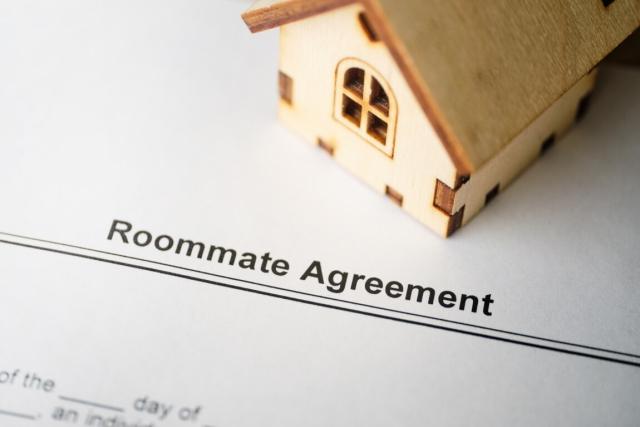Living with roommates can be an enriching experience, offering companionship, shared responsibilities, and the opportunity to create lasting friendships. However, without clear communication and boundaries, even the most well-intentioned living arrangements can lead to tension and misunderstandings. This is where a well-drafted roommate agreement becomes invaluable.
This guide explores drafting a roommate agreement, a document that sets expectations, responsibilities, and guidelines for all parties. Whether you're moving in with friends, acquaintances, or strangers, a roommate agreement serves as a roadmap for navigating potential conflicts and fostering a positive living environment.
Step 1: Understand the Purpose of the Agreement
Before you can draft a copy of the roommate agreement, you and the others need to understand its purpose. A roommate agreement is a legally non-binding contract between individuals sharing a living space. Roommate agreements should not be confused with a lease agreement. It’s a personal household contract created by the people who share an apartment. While it doesn't hold the same weight as a lease agreement in the eyes of the law, it serves as a crucial tool for outlining the expectations, responsibilities, and boundaries of all parties involved in a shared living arrangement.
Step 2: Make it Fair and Feasible for All
When you're crafting a roommate agreement - make sure it's fair and feasible for everyone involved. You've got to remember, we're all different. We've got our own habits, preferences, and pet peeves. So, when you're laying down the law, it's crucial that everyone's voice is heard.
Start by having an open discussion. Schedule a meeting with all roommates to discuss their individual preferences, concerns, and expectations regarding shared living. Encourage open communication and ensure that everyone can voice their opinions and contribute to the drafting process.
Once you've got everything out in the open, start drafting the agreement. Remember, it's not set in stone. It's a living document, which means it can be revised as circumstances change.
Step 3: Plan and Execute the Draft
Drafting a roommate agreement requires careful planning and execution to ensure that all aspects are covered and that the document accurately reflects the needs and expectations of everyone involved. Here are some key considerations to keep in mind when drafting your agreement:
Roommates’ Names and Address of Residence
The first section of the agreement should have the names of those sharing the apartment, the name and address of the community, as well as unit number. Have each person sign by their printed name and date the contract.
Decide How Rent Is Divided
Within this clause, make it very clear how much rent each person owes. Roommates typically divide the payment equally. However, some may agree to different amounts depending on room size, number of bathrooms, etc. Write down what each person owes to deter any disputes later on.
If a deposit was put down, include in the agreement who (or who all) paid the amount and how much is expected back to that person (or persons) when they move out.
Note the Terms of Termination
When someone unexpectedly bails out from an apartment, everyone else must make up the difference. It might be in the roommates' best interest to include a form of action that must take place by the person moving out before the lease expiration. Make it clear within the roommate agreement that the person leaving either has to:
a. Find a new tenant (that is approved by the others) before moving out
b. Continue paying rent until a new tenant can be found by the group
A term of termination clause can protect you from an abrupt financial setback. When a new roommate is found, notify the leasing office so that the person can be added to the lease agreement.
Agree on Shared Expenses
Like with the division of rent, roommates must also come to an agreement on the division of shared expenses such as utility and service bills. There are a couple of ways to do this:
a. Divide all bills equally
b. Allocate a percentage based on use
c. *Have each roommate pay a bill (or two, depending on how many there are) in their name
*For example: Alex, Heather, and Nina share an apartment. Alex pays for the electricity and water, Heather pays for natural gas and movie streaming service, and Nina pays for garbage and cable/Internet.
Most roommates typically go with the first option since it's the fairest of the three. But, depending on the situation in your apartment, b or c may be the more suitable choice.
Outline Shared and Personal Spaces
If you agree on private areas within the apartment, include them in the agreement. Acknowledge and respect each roommate's need for privacy and personal space. Establish guidelines for entering each other's rooms and discuss boundaries regarding borrowing personal belongings. Common areas should also be outlined, which include the living room, dining room, balcony/patio, office space, and kitchen. If you have appliances or things in the shared spaces that you don't want others to use, state it in a clause of the contract. Divide storage closets and cabinetry equally if they're in a common space or a shared bathroom.
Set Rules for House Guests
Visitors and overnight guests should be addressed within the roommate agreement because apartment guests can pose a major source of conflict between roommates. Discuss how long they can stay, if advance notice must be given to others regarding overnight/visiting guests, etc.
Cleaning Responsibilities
Create a chart of chores that need to be done in the common spaces around the apartment and divide them equally among each other. Be sure to list who is responsible for what and on what days the chores need to be finished. Remember to come up with these chores together. Rotating tasks or using a chore chart can help ensure everyone contributes their fair share to maintain the living space.
Miscellaneous
Some miscellaneous things to consider:
- Parties and entertaining
- Pets
- Smoking
- Alcohol
- Decorating
We all like to entertain at our apartments, but it’s best to make sure everyone is okay with it. One roommate may have an early morning meeting, or the other may be ill and need rest. Include in the contract how early in advance one needs to give notice about entertaining. *Note the quiet hours in the apartment community.
Another thing to include in the contract is pets. If everyone is on board or okay with the rules laid out for a pet, feel free to adopt if you live in a pet-friendly community. Be sure to include who is the rightful owner.
Be mindful that the apartment community may be a non-smoking community, or they may have set rules in place regarding smoking in the apartments, buildings, and surrounding areas. If smoking is allowed and all roommates are okay with one or more roommates smoking, include in the agreement where a person is allowed to smoke, such as the balcony or parking lot.
Decide together if alcohol is allowed in the apartment and state it in the contract. Some apartments, like student housing, may have rules against alcohol. Ask the leasing agent if it is allowed or prohibited in your apartment.
The apartment is everyone’s home, so to keep the peace, see if anyone has any objections to decorations. If not, that’s cool. However, some may be against wall art, sculptures, or large paintings in the common areas, so be sure to communicate with your roommate before you start decorating. The roommate agreement provides an opportunity to discuss decorating in the common spaces of your shared home.
Finalize the Agreement
Once all roommates are satisfied with the agreement, finalize the document and arrange for everyone to sign and date it. Make copies for each roommate to keep for their records, and consider having a digital version stored in a shared online platform for easy reference.
Click here for a roommate agreement template created by the University of California San Diego.
By taking the time to collaboratively draft and finalize a comprehensive roommate agreement, roommates can effectively communicate their needs, responsibilities, and boundaries, thereby minimizing misunderstandings and fostering a sense of unity throughout the household.






